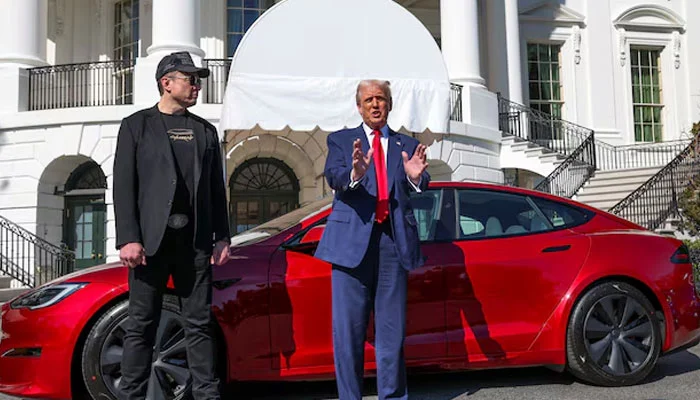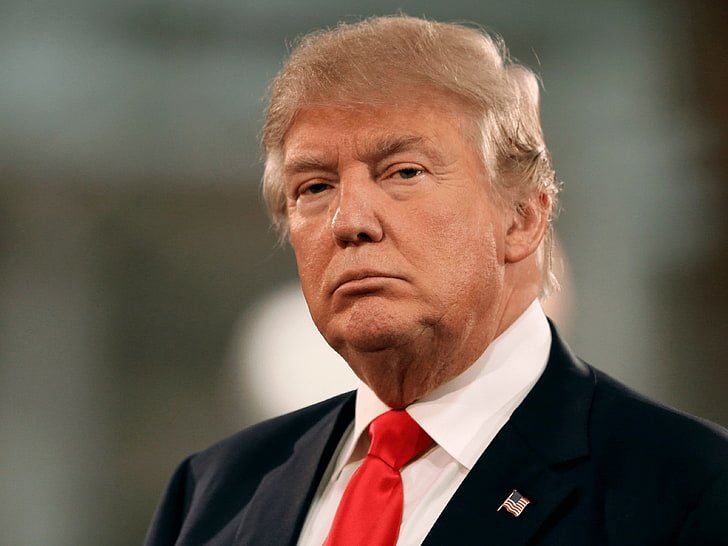Trump Hints at Deporting Elon Musk Amid Rift Over Spending Bill: A Shocking Turn in Billionaire Politics
In a dramatic escalation of tensions between two of the most high-profile figures in American politics and business, former U.S. President Donald Trump on Tuesday suggested he might consider the deportation of Tesla and SpaceX CEO Elon Musk. The comment comes in the wake of Musk’s outspoken criticism of Trump’s signature legislative proposal, dubbed the “One Big Beautiful Bill.”
Speaking to reporters at the White House, Trump appeared visibly agitated when asked about Musk’s sharp rebuke of the multi-trillion-dollar spending bill, which aimed to reshape America’s energy, transportation, and infrastructure sectors. When directly questioned about whether deportation was a possibility for the South African-born entrepreneur, Trump replied, “I don’t know. We’ll have to take a look.”
The Remark That Sparked a Firestorm
The former president’s tone was half-serious but laced with threat. “We might have to put DOGE on Elon,” Trump added, referring to the Department of Government Efficiency — a satirical government oversight body Musk had briefly chaired before stepping down in May. “You know what DOGE is? DOGE is the monster that might have to go back and eat Elon.”
The remark, bizarre as it sounded, quickly made headlines across national and international media outlets. While some observers dismissed it as typical Trumpian bravado, others saw it as a sign of a deepening rift between two once-close allies.
From Ally to Adversary: The Rise and Fall of Trump-Musk Relations
It wasn’t always this way.
Musk had been one of Trump’s biggest private-sector allies during the 2024 presidential campaign. He donated generously to the Trump campaign and frequently appeared at rallies and press conferences. When Trump returned to the White House in January 2025, Musk was expected to play a central role in shaping the administration’s science and innovation policies.
Shortly after Trump took office, Musk was appointed as the inaugural head of the Department of Government Efficiency (DOGE), a newly formed body tasked with reducing bureaucratic waste and streamlining federal processes. The appointment was seen as symbolic of Musk’s growing political influence — and his closeness to the new administration.
But the relationship began to unravel earlier this year over the details of the “One Big Beautiful Bill,” a sprawling spending package aimed at bolstering American energy independence, rebuilding infrastructure, and revitalizing the economy. The bill had initially included significant provisions to boost the electric vehicle (EV) sector, but those were later removed during negotiations with congressional Republicans.
Musk, who had lobbied aggressively for those provisions, was incensed.
Musk’s Public Criticism of the Spending Bill
In a series of posts on his social media platform X (formerly Twitter), Musk lambasted the bill as “short-sighted,” “fossil-fueled,” and “a betrayal of America’s clean energy future.” He accused the GOP of caving to oil and gas lobbyists and abandoning the technological leadership the United States had worked hard to cultivate.
“America is being left behind in the global EV race,” Musk wrote. “This bill does nothing but protect outdated industries and reward political cronies. It’s a disaster for innovation.”
The criticism didn’t stop there. Musk went on to suggest that the bill’s final version was the product of “backroom deals” and “anti-progress forces” within both major political parties. He even floated the idea of forming a new political party, the “America Party,” which he said would champion technology, transparency, and sustainability.
Trump Strikes Back
Trump, who has little tolerance for dissent within his ranks, wasted no time responding. Speaking at a press event Monday night and later posting on his Truth Social platform, Trump blasted Musk’s comments and questioned the billionaire’s loyalty.
“He’s just upset he didn’t get his way. Elon’s been crying about EV subsidies like a spoiled child,” Trump posted. “Let’s be honest — without government help, he’d probably have to close shop and head back home to South Africa.”
This marked the first time Trump had publicly alluded to Musk’s immigration status in a threatening tone. While Musk is a naturalized U.S. citizen, the comment raised eyebrows and fueled speculation about whether Trump would attempt to use immigration law as leverage in their ongoing feud.
The DOGE Factor
Adding another layer of intrigue is the role of the Department of Government Efficiency, or DOGE. Originally a tongue-in-cheek creation meant to reduce red tape in Washington, the agency quickly became one of the most talked-about experiments in modern governance.
Musk had initially embraced his role at DOGE, implementing AI-driven audits and digital management systems that reportedly saved taxpayers billions. But internal conflicts and pressure from more traditional bureaucrats led to his resignation in late May.
Now, Trump is threatening to unleash the very agency Musk helped build against him.
“DOGE knows where the bodies are buried,” Trump told reporters Tuesday. “If Elon wants to play hardball, he’s going to learn that we can play harder.”
Political Fallout and Reactions
The political world reacted swiftly to the unfolding drama.
Democrats seized on the controversy to criticize Trump’s leadership style and accuse him of using the threat of deportation to silence dissent. Senator Elizabeth Warren called Trump’s comments “authoritarian” and “deeply un-American.”
“Elon Musk may be controversial, but threatening a U.S. citizen with deportation because he disagrees with the president? That’s crossing a very dangerous line,” Warren said in a statement.
On the other side, Trump loyalists doubled down. Conservative talk show host Tucker Carlson said Musk “forgot who helped put him where he is today” and accused him of “biting the hand that fed him.”
Meanwhile, Libertarian and centrist circles expressed concern over the idea of a new political party led by Musk. While some welcomed the idea of shaking up the two-party system, others worried it could split the right-leaning vote and hand future elections to Democrats.
Musk Stands His Ground
Despite the threats, Musk remained defiant.
In a televised interview with Bloomberg Tech, the billionaire laughed off Trump’s comments and dismissed them as “political theater.”
“Look, I’ve heard crazier things from him. I don’t take it personally,” Musk said. “But I do take the direction of this country seriously. And if that means making some enemies in Washington, so be it.”
He also reaffirmed his interest in launching the “America Party,” though he clarified that any such effort would be “a long-term movement, not just a reaction to one bill or one administration.”
Musk further claimed that his companies — including Tesla, SpaceX, Neuralink, and The Boring Company — would survive just fine without federal support.
“We build products people want. That’s the real subsidy,” he said.
What’s Next?
With tensions continuing to rise, the conflict between Trump and Musk may just be getting started.
Political analysts say the fallout could have long-term implications for both men. For Trump, alienating a wealthy and influential backer like Musk could hurt his 2028 re-election campaign. For Musk, the fight positions him as a political force independent of either major party — but also exposes him to new legal and regulatory scrutiny.
White House officials have declined to clarify whether the former president was serious about pursuing Musk’s deportation, but the comment has already had a chilling effect in Silicon Valley. Several tech leaders expressed concern privately that the incident could mark the beginning of a broader crackdown on corporate dissent.
“This is a wake-up call,” said a venture capitalist who requested anonymity. “If they can come after Elon, they can come after anyone.”
___________________________________________________________________________________
Join Pakistan Army as a Nurse: Registration Begins! power 7
Read This Article
___________________________________________________________________________________
A New Era of Tech-Politics Clash?
The Musk-Trump saga may represent more than just a personal feud. It could be the harbinger of a larger shift in the relationship between politics and technology.
For years, tech leaders have operated in a kind of ideological gray area — supporting various candidates and policies while remaining largely insulated from direct political retaliation. That era may now be over.
As political polarization deepens and issues like climate change, automation, and AI regulation take center stage, the clash between visionary entrepreneurs and populist politicians may become more common.
Elon Musk, once seen as a hero of both parties, now finds himself at the center of a uniquely American drama — one that blurs the lines between politics, power, and personality.
Whether Trump’s comments lead to real action or fade into the noise of the news cycle remains to be seen. But one thing is clear: the alliance between the billionaire innovator and the populist president is fractured — and the consequences could reshape the political and technological landscape for years to come.
Trump Hints at Deporting Elon Musk Amid Rift Over Spending Bill: A Shocking Turn in Billionaire Politics
In a dramatic escalation of tensions between two of the most high-profile figures in American politics and business, former U.S. President Donald Trump on Tuesday suggested he might consider the deportation of Tesla and SpaceX CEO Elon Musk. The comment comes in the wake of Musk’s outspoken criticism of Trump’s signature legislative proposal, dubbed the “One Big Beautiful Bill.”
Speaking to reporters at the White House, Trump appeared visibly agitated when asked about Musk’s sharp rebuke of the multi-trillion-dollar spending bill, which aimed to reshape America’s energy, transportation, and infrastructure sectors. When directly questioned about whether deportation was a possibility for the South African-born entrepreneur, Trump replied, “I don’t know. We’ll have to take a look.”
The Remark That Sparked a Firestorm
The former president’s tone was half-serious but laced with threat. “We might have to put DOGE on Elon,” Trump added, referring to the Department of Government Efficiency — a satirical government oversight body Musk had briefly chaired before stepping down in May. “You know what DOGE is? DOGE is the monster that might have to go back and eat Elon.”
The remark, bizarre as it sounded, quickly made headlines across national and international media outlets. While some observers dismissed it as typical Trumpian bravado, others saw it as a sign of a deepening rift between two once-close allies.
From Ally to Adversary: The Rise and Fall of Trump-Musk Relations
It wasn’t always this way.
Musk had been one of Trump’s biggest private-sector allies during the 2024 presidential campaign. He donated generously to the Trump campaign and frequently appeared at rallies and press conferences. When Trump returned to the White House in January 2025, Musk was expected to play a central role in shaping the administration’s science and innovation policies.
Shortly after Trump took office, Musk was appointed as the inaugural head of the Department of Government Efficiency (DOGE), a newly formed body tasked with reducing bureaucratic waste and streamlining federal processes. The appointment was seen as symbolic of Musk’s growing political influence — and his closeness to the new administration.
But the relationship began to unravel earlier this year over the details of the “One Big Beautiful Bill,” a sprawling spending package aimed at bolstering American energy independence, rebuilding infrastructure, and revitalizing the economy. The bill had initially included significant provisions to boost the electric vehicle (EV) sector, but those were later removed during negotiations with congressional Republicans.
Musk, who had lobbied aggressively for those provisions, was incensed.
Musk’s Public Criticism of the Spending Bill
In a series of posts on his social media platform X (formerly Twitter), Musk lambasted the bill as “short-sighted,” “fossil-fueled,” and “a betrayal of America’s clean energy future.” He accused the GOP of caving to oil and gas lobbyists and abandoning the technological leadership the United States had worked hard to cultivate.
“America is being left behind in the global EV race,” Musk wrote. “This bill does nothing but protect outdated industries and reward political cronies. It’s a disaster for innovation.”
The criticism didn’t stop there. Musk went on to suggest that the bill’s final version was the product of “backroom deals” and “anti-progress forces” within both major political parties. He even floated the idea of forming a new political party, the “America Party,” which he said would champion technology, transparency, and sustainability.
Trump Strikes Back
Trump, who has little tolerance for dissent within his ranks, wasted no time responding. Speaking at a press event Monday night and later posting on his Truth Social platform, Trump blasted Musk’s comments and questioned the billionaire’s loyalty.
“He’s just upset he didn’t get his way. Elon’s been crying about EV subsidies like a spoiled child,” Trump posted. “Let’s be honest — without government help, he’d probably have to close shop and head back home to South Africa.”
This marked the first time Trump had publicly alluded to Musk’s immigration status in a threatening tone. While Musk is a naturalized U.S. citizen, the comment raised eyebrows and fueled speculation about whether Trump would attempt to use immigration law as leverage in their ongoing feud.
The DOGE Factor
Adding another layer of intrigue is the role of the Department of Government Efficiency, or DOGE. Originally a tongue-in-cheek creation meant to reduce red tape in Washington, the agency quickly became one of the most talked-about experiments in modern governance.
Musk had initially embraced his role at DOGE, implementing AI-driven audits and digital management systems that reportedly saved taxpayers billions. But internal conflicts and pressure from more traditional bureaucrats led to his resignation in late May.
Now, Trump is threatening to unleash the very agency Musk helped build against him.
“DOGE knows where the bodies are buried,” Trump told reporters Tuesday. “If Elon wants to play hardball, he’s going to learn that we can play harder.”
Political Fallout and Reactions
The political world reacted swiftly to the unfolding drama.
Democrats seized on the controversy to criticize Trump’s leadership style and accuse him of using the threat of deportation to silence dissent. Senator Elizabeth Warren called Trump’s comments “authoritarian” and “deeply un-American.”
“Elon Musk may be controversial, but threatening a U.S. citizen with deportation because he disagrees with the president? That’s crossing a very dangerous line,” Warren said in a statement.
On the other side, Trump loyalists doubled down. Conservative talk show host Tucker Carlson said Musk “forgot who helped put him where he is today” and accused him of “biting the hand that fed him.”
Meanwhile, Libertarian and centrist circles expressed concern over the idea of a new political party led by Musk. While some welcomed the idea of shaking up the two-party system, others worried it could split the right-leaning vote and hand future elections to Democrats.
Musk Stands His Ground
Despite the threats, Musk remained defiant.
In a televised interview with Bloomberg Tech, the billionaire laughed off Trump’s comments and dismissed them as “political theater.”
“Look, I’ve heard crazier things from him. I don’t take it personally,” Musk said. “But I do take the direction of this country seriously. And if that means making some enemies in Washington, so be it.”
He also reaffirmed his interest in launching the “America Party,” though he clarified that any such effort would be “a long-term movement, not just a reaction to one bill or one administration.”
Musk further claimed that his companies — including Tesla, SpaceX, Neuralink, and The Boring Company — would survive just fine without federal support.
“We build products people want. That’s the real subsidy,” he said.
What’s Next?
With tensions continuing to rise, the conflict between Trump and Musk may just be getting started.
Political analysts say the fallout could have long-term implications for both men. For Trump, alienating a wealthy and influential backer like Musk could hurt his 2028 re-election campaign. For Musk, the fight positions him as a political force independent of either major party — but also exposes him to new legal and regulatory scrutiny.
White House officials have declined to clarify whether the former president was serious about pursuing Musk’s deportation, but the comment has already had a chilling effect in Silicon Valley. Several tech leaders expressed concern privately that the incident could mark the beginning of a broader crackdown on corporate dissent.
“This is a wake-up call,” said a venture capitalist who requested anonymity. “If they can come after Elon, they can come after anyone.”
A New Era of Tech-Politics Clash?
The Musk-Trump saga may represent more than just a personal feud. It could be the harbinger of a larger shift in the relationship between politics and technology.
For years, tech leaders have operated in a kind of ideological gray area — supporting various candidates and policies while remaining largely insulated from direct political retaliation. That era may now be over.
As political polarization deepens and issues like climate change, automation, and AI regulation take center stage, the clash between visionary entrepreneurs and populist politicians may become more common.
Elon Musk, once seen as a hero of both parties, now finds himself at the center of a uniquely American drama — one that blurs the lines between politics, power, and personality.




